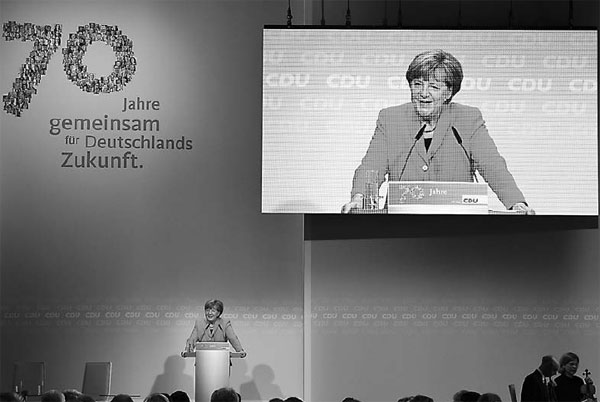'Grexit' threatens Merkel's legacy
"If you break it, you own it," then-US secretary of state Colin Powell warned then-US president George W. Bush before Bush launched the 2003 invasion of Iraq.
Whether it will ever be fair to blame Angela Merkel for "breaking" Greece is debatable.
But if the eurozone's weakest link does default this week and is eventually forced out of the single currency, it seems inevitable that the German chancellor, Europe's most powerful leader, would "own" the Greek problem, and that a decision to let Athens go would profoundly shape her legacy.
For months, the notoriously cautious Merkel has been wrestling with the question of whether to risk a "Grexit" and accept the financial, economic and geopolitical backlash it would surely unleash.
Unlike her finance minister, Wolfgang Schaeuble, who sent abundant signals in recent months that he could accept a eurozone that does not include Greece, Merkel has been determined to avoid such an outcome, according to her closest advisers.
If Greece ends up leaving the eurozone anyway, many in Germany and elsewhere will blame the government of Greek Prime Minister Alexis Tsipras, which came to power in January. It has infuriated its partners with what they have perceived to be an erratic, confrontational stance in the debt talks.
Tsipras's call on Friday for a referendum on Europe's latest bailout offer, only days before Greece is due to run out of cash, made it easy for Merkel to say enough is enough, and threaten to pull the plug once and for all.
But it will be Merkel, more than any other European leader, who will have to sort through the rubble of a Grexit and answer the question of why disaster was not averted.
A Greek exit could lead to a humanitarian crisis on Europe's southern rim, spark contagion in euro countries that are only just emerging from years of deep recession, and stoke a fiery new debate about German austerity policies and Merkel's handling of the crisis.
Allowing Greece to exit would be by far the boldest move she has taken since coming to power nearly a decade ago, far riskier than her decision in 2011 to phase out nuclear power.
In private conversations, Merkel has acknowledged as much, saying her biggest fear is that Germany could be blamed for "blowing up Europe" for the third time in a century.
With a British referendum on its membership in the European Union looming, the Ukraine conflict unresolved and the continent struggling to find answers to a migration crisis and growing threat from Islamic extremists, chaos in Greece would send a horrible signal to the world about the state of Europe.
"Europe's internal crisis is playing out in a dangerous, unstable geopolitical environment," former German foreign minister Joschka Fischer wrote in a recent article for Project Syndicate. "Preventing the EU from falling apart will require, first and foremost, a strategic solution to the Greek crisis."
|
German Chancellor Angela Merkel gives a speech during an event marking the 70th anniversary of the Christian Democratic Union party on Monday in Berlin. John Macdougall / AFP |
(China Daily 06/30/2015 page11)















